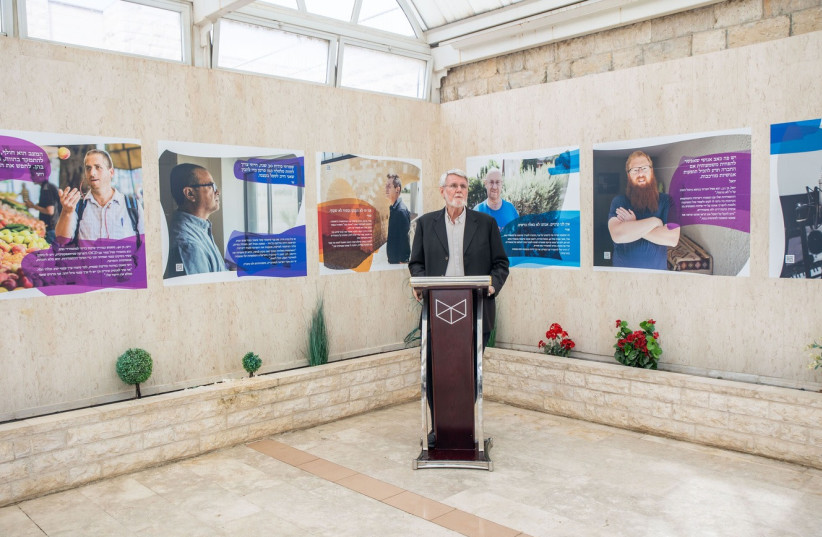For many years, people with mental health problems have hidden their condition from friends and even relatives because of the stigma attached to psychiatric illness.
Six years ago, people with mental health challenges agreed to have life-sized posters of themselves displayed at Boston’s Logan Airport in a project called “Deconstructing Stigma.”
Now, after a year of planning, it has been adopted at the Jerusalem College of Technology (JCT), in collaboration with Harvard Medical School’s McLean Hospital. The Israeli project inspired by McLean’s global campaign to combat the stigma surrounding mental health will be carried out over a full academic year by a class of 30 fourth-year nursing students from Ofek, JCT’s special track for haredi (ultra-Orthodox Jewish) female students who were chosen for the campaign with the hope of making them agents of change in Israeli society.
The pop-up installations are already on display in Jerusalem at JCT’s Tal and Lev Campuses in Jerusalem where there are male and female nursing and engineering students and at the Shaare Zedek Medical Center nearby.
The display features life-sized posters of individuals with mental health challenges who volunteered to publicly and boldly share their personal struggles. The goal of the campaign is to highlight the complexity of living with a psychiatric disorder, seeking treatment, navigating insurance and healthcare systems and facing stigma.
A study looking at attitudes around mental health six months after the reform effort went into effect found that most people still felt uncomfortable seeking referral to mental health services through the public health system. Arab Israelis have lower levels of comfort in seeking mental health care than Jewish Israelis. Only 13% of respondents to another recent study said they would seek professional treatment if they felt anxious or tense but would seek help immediately if they felt they were in crisis due to a “severe” psychiatric illness.
“The goal of Deconstructing Stigma is to bring to life what occurs behind closed doors,” said Dr. David Rosmarin, director of the spirituality and mental health program at McLean Hospital and an associate professor in the psychiatry department at Harvard Medical School. “There’s a lot of mystery around what happens in people who have a mental illness. With this initiative, our volunteers are proudly coming forward and saying, ‘Here I am. This is what happened to me, this is how I deal with it, and this is how I’m thriving.’ In doing so, we humanize what mental illness looks like.”
Partnerships across the world
Inspired by seeing the posters at Logan Airport, Stuart Katz – founding director of OGEN – the Israel Association for the Advancement of Mental Health – was determined to bring the initiative to Israel and helped spark the partnership between McLean and JCT. Katz and Dr. Zvika Orr, a senior lecturer at JCT’s Jelinek School of Nursing, are spearheading the campaign here.
McLean partnered with Katz, a longtime advocate for humanitarian, mental health and environmental causes, to bring mental health education and anti-stigma programming to Israel. Katz saw McLean’s display at the airport in 2018 when a family member was receiving care at McLean; he was inspired to contact the hospital about bringing the program to Israel. A year later, McLean representatives met with more than 20 hospitals, universities, museums, municipalities, healthcare organizations and others in Israel to discuss ways to highlight the importance of mental health. These meetings were the start of several ongoing collaborations between McLean and Israeli organizations.
“From my perspective, the problem of mental health stigma is worse in Israel than the US because of the culture, the religion, and the ‘macho’ attitude,” Katz explained. However, he said that attitudes are shifting and enthusiasm for battling stigma is on the rise.
Mental health is an acute problem globally, and Israel is no exception. Nationally, the Health Ministry reports that suicide is the second-most common cause of death for Israeli males ages 15 to 24, and third-most common for young females. Nearly half of Israel’s population suffer at some point in life from mental-health issues, with anxiety and depression being the most common challenges.
“In Israel, we are constantly told to be the ‘gibor’ (hero) and not show any weakness. This makes mental health stigmas particularly felt here,” Katz said, explaining why he felt it was critical to bring the campaign to Israel.
The COVID-19 pandemic has led to the changing of attitudes to some degree, since many were suddenly burdened by newfound feelings of depression and anxiety, creating a need to address mental health stigmas on a national scale.
Localizing the campaign for an Israeli audience, the installation features a diverse array of Israelis from various religious backgrounds and locations, including groups particularly vulnerable to stigma such as haredi Jews and Muslims.
Orr and other JCT faculty are working with Rosmarin and Dr. Steven Tzvi Pirutinsky, an associate professor at Touro University, to conduct an in-depth research project measuring how the attitudes of JCT’s students, faculty and staff’s views of mental illness have changed following the campaign.
“JCT is an ideal setting for Deconstructing Stigma in Israel, since its Jelinek School of Nursing has a special track for haredi female students,” said Rosmarin, who explained that nurses are often agents of change within the medical system and society at large. In addition to the Deconstructing Stigma poster installations, JCT has created a special curriculum for its nursing students who helped conduct in-depth interviews with those who volunteered for the public posters about their mental health struggles. Orr said that early data indicate that the participating students are already experiencing meaningful changes in their attitudes about mental health.
“We hope our students come out of this project forever changed,” Orr continued. “Instead of judging or being fearful of those with mental illness, many of them are now sharing that they understand these are common struggles. They are developing empathy and affinity for the brave men and women who participated in this campaign. We are excited to see continued increased interest in addressing it, which is very positive,” he said.




